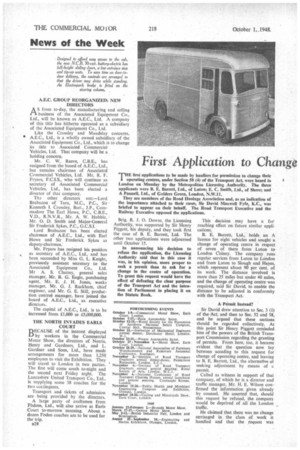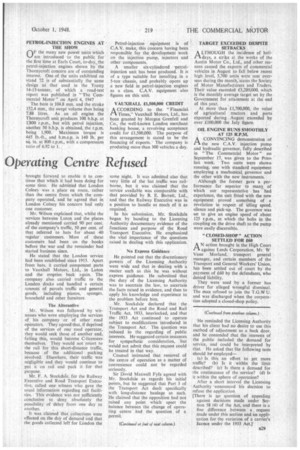First Application to Change
Page 62

Page 63

If you've noticed an error in this article please click here to report it so we can fix it.
Operating Centre Refused
'THE, first applications to be made by hauliers for permission to change their I operating centres, under Section 58 (4) of the Transport Act, were heard in London on Monday by the Metropolitan Licensing Authority. The three applicants were B. E. Barrett, Ltd., of Luton; E. C. Smith, Ltd., of Shere; and A Pannell, Ltd., of Golders Green, London, N.W.11.
They are members of the Road Haulage Association and, as an indication of the importance attached to their cases, Sir David Maxwell Fyfe, K.C., was briefed to appear on their behalf. The Road Transport Executive and the Railway Executive opposed the applications.
Brig. R. J. 0. Dowse, the Licensing Authority, was supported by Sir Henry Piggott, his deputy, and they took first the case of B. E. Barrett, Ltd. The other two applications were adjourned until October 15.
In announcing his decision to refuse the application, the Licensing Authority said that in this case it was, in his opinion, more proper to seek a permit than to ask for a change in the centre of operation. To grant this request would have the effect of defeating the clear purpose of the Transport Act and the intention of Parliament in placing it on the Statute Book.
This decision may have a far reaching effect on future similar appli. cations.
B. E. Barrett, LW., holds an A licence for eight vehicles and sought a change of operating centre in respect of seven of them from Luton to London Colney. The company runs regular services from Luton to London and from Luton to Slough and Hayes, which represent about 90 per cent, of its work. The distance involved is more than 25 mites but under 40 miles, and the change of operating centre was required, said Sir David, to enable the distance to be adjusted in conformity with the Transport Act.
A Permit Instead?
Sir David drew attention to Sec. 3 (1) of the Act, and then to Sec. 52 and 58, and he argued that these sections should be regarded collectively. At this point Sir Henry Piggott reminded him of the powers of the British Transport Commission regarding the granting of permits. From here, too, it became evident that the question now lay between acceding to this request for change of operating centre, and leaving to B. E. Barrett, Ltd., the alternative of seeking adjustment by means of a permit.
Called as witness in support of that company, of which he is a director and traffic manager, Mr. H. E. Wilson confirmed the information given already by counsel. He asserted that, should this request be refused, the company would be deprived of all the London traffic.
He claimed that there was no change envisaged in the class of work it handled and that the request was brought forward to enable it to continue that which it had been doing for some time. He admitted that London Colney was a place en route, rather than the centre from which the company operated, and he agreed that in London Colney his concern had only one customer.
Mr. Wilson explained that, whilst the services between Luton and the places already mentioned carried 90 per cent. of the company's traffic, 50 per cent. of that referred to hats for about -40 regular custOmers. Most of these customers had been on the books before the war and the remainder had started business since.
He stated that the London service had been established since 1915. Apart from hats, it carried component parts to Vauxhall Motors, Ltd., in Luton and the empties back again. The company also carried traffic to the London docks and handled a certain amount of parcels traffic and general goods, including pianos, sponges. household and other furniture The Alternative
.Mr. Wilson was followed by witnesses who were employing the services of his company or of other road operators. They agreed that, if deprived of the services of one road operator, they would seek those of another and, failing this, would become C-licensees themselves. They would not resort to the rail for this short-distance traffic, because of the additional packing involved. Elsewhere, their traffic was negligible and they would continue to put it on rail and pack it for that purpose.
Mr. F. A. Stockdale, for the Railway Executive and Road Transport Executive, called one witness who gave the usual information regarding rail facilities. This evidence was not sufficiently conclusive to deny absolutely the possibility of delay from one day to another
lt was claimed that collections were effected on the daY of demand and that the goods collected left for London the same night. It was admitted also that very little of the hat „traffic was railborne, but it was claimed that the service available was comparable with that provided by B. E. Barrett, Ltd,, and that the Railway Executive was in a position to handle as much of it as required.
In his submission, Mr. Stockdale began by handing to the Licensing Authority documentary evidence of the functions and purpose of the Road Transport Executive. He emphasized the vital importance of the questions raised in dealing with this application.
No Express Guidance He pointed out that the discretionary powers of the Licensing Authority were wide and that in dealing with a matter such as this he was without express guidance. He submitted that the duty of the Licensing Authority was to ascertain the law, to ascertain the facts raised in evidence, and then to apply his knowledge and experience to the problem before him.
. Mr. Stockdale declared that the Transport Act and the Road and Rail Traffic Act, 1933, interlocked, and that the 1933 Act continued to operate subject to modifications introduced in the Transport Act. The question was reduced to the regarding of public interests. He suggested certain instances for sympathetic consideration, but would not admit that this request could be treated in that way.
Counsel intimated that removal of the centre of operation as a matter of convenience could not be regarded seriously.
Sir David Maxwell Fyfe agreed with Mr. Stockdale as regards his initial points, but he suggested that Part 3 ofthe Transport Act dealt specifically with long-distance haulage as such. He claimed that the opposition had not raised any point which upset the balance between the change of operating centre And the question of a permit. He reminded the Licensing Authority that his client had no desire to use this method of adjustment as a back door, and he contended that the interests of the public included the demand for service, and could be interpreted by that. He asked that the following tests should be, employed—
(a) Is this an effort to get more traffic? (b) Is it within the limit described? (c) Is there a demand for the continuance of the service? (d) Is it within the sphere of operation?
After a short interval the Licensing Authority 'announced his decision to refuse the application.
[There is up question of appealing against decisions made under Section 58 (4) of the Act, and there is a fine difference between a request made under this section and an application for the variation of a carrier's licence under the 1933 Act.I












































































































































































































































